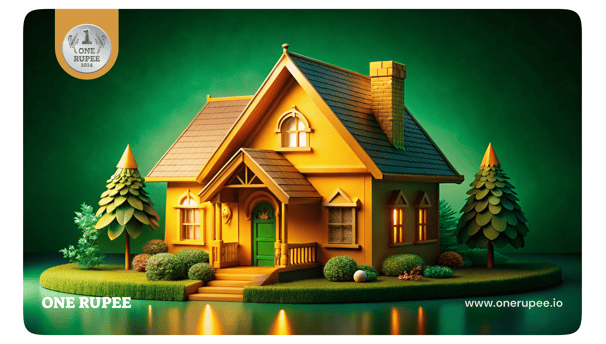Renting vs. Buying a House: What’s the Smarter Choice?
Every Indian family dreams of owning their own home one day. Growing up, my family didn’t have much money, so we always lived in rented houses. We frequently moved, and each time, my mother would make the new place feel like our own. But soon, we would have to pack up and move again. The constant shifting made us yearn for a house of our own, something many people desire because it brings a sense of stability.
PERSONAL FINANCE
By ONE RUPEE
8/30/20243 min read


Renting vs. Buying a House: What’s the Smarter Choice?
Every Indian family dreams of owning their own home one day. Growing up, my family didn’t have much money, so we always lived in rented houses. We frequently moved, and each time, my mother would make the new place feel like our own. But soon, we would have to pack up and move again. The constant shifting made us yearn for a house of our own, something many people desire because it brings a sense of stability.
However, is buying a house the right choice for everyone? In this blog, we’ll explore whether you should rent or buy a home and the financial implications of both decisions.
The Emotional Connection to Buying a Home
Owning a home is an emotional decision. It's a significant milestone, especially when buying for your partner or family. It’s one of those life moments that bring joy and a sense of accomplishment. But before you get swept away by emotions, it’s essential to approach this decision logically.
The True Costs of Owning a Home
While the idea of owning a home is appealing, it comes with several costs that go beyond the down payment and monthly loan payments.
Home Loan Interest: Most people don’t have enough savings to buy a house outright, which means they take out loans. The interest on these loans can add up, making you feel like you’re paying for a house that isn’t fully yours yet. Even after you’ve paid off the loan, the cost of maintenance and repairs continues.
Maintenance and Repairs: Owning a house means you’re responsible for all repairs and maintenance costs, which can add up over time.
Property Taxes and Insurance: When you own a home, you need to pay property taxes and insurance, which are additional expenses renters don’t have to worry about.
The Benefits of Renting a Home
Renting, on the other hand, offers several financial advantages that shouldn’t be overlooked:
Lower Monthly Costs: In many cases, the rent is much lower than a mortgage payment. For example, in cities like Gurgaon, a luxury house worth ₹5 crores may rent for only ₹55,000 per month. That’s just 1.2% of the home’s value annually.
Flexibility: Renting gives you the freedom to move whenever you want, whether for a new job, better opportunities, or a change in lifestyle. You aren’t tied down by a mortgage.
Fewer Responsibilities: As a renter, you don’t have to worry about property maintenance, repairs, or other homeowner expenses. Your landlord handles those, giving you peace of mind.
Ability to Invest Elsewhere: By renting, you free up money that you could invest in other areas, such as stocks or businesses, potentially earning more returns than you would by investing in a house.
Renting vs. Buying: A Financial Perspective
Let’s break down the numbers. If you rent a house worth ₹50 lakhs with a rental yield of 2%, your monthly rent would be around ₹8,500. If you bought the same house, you’d likely need a loan of ₹40 lakhs after making a ₹10 lakh down payment. The monthly EMI for this loan would be about ₹35,000 for 20 years.
That’s ₹35,000 per month paid to the bank, while renting the same house would only cost you ₹8,500. The difference? Renting leaves you with more money to invest elsewhere, potentially earning a higher return.
The Long-Term View: Security vs. Flexibility
Buying a house may provide long-term security, especially if you plan to pass it down to your children. But for many, especially those early in their careers, renting offers more flexibility. Your job may change, you might need to relocate, or your family situation could evolve. Being tied down to a house could limit your opportunities.
On the flip side, owning a home later in life, once you’re financially secure, can provide stability and a sense of accomplishment.
Conclusion: Should You Rent or Buy?
Deciding whether to rent or buy a house depends on your financial situation, career stage, and personal preferences. If you’re just starting out, renting gives you the flexibility to adapt to changing circumstances and the freedom to invest your money elsewhere. But if you’re emotionally attached to the idea of owning a home, have the financial means, and plan to settle down in one place for the long term, buying could be the right choice for you.
Ultimately, there’s no one-size-fits-all answer. The key is to weigh the pros and cons, both financially and emotionally, before making your decision.

Simplifying your financial journey, one rupee at a time.
Quick Links
Disclaimer:
The content provided on the One Rupee blog is for informational purposes only and should not be considered as financial advice. While we strive to provide accurate and up-to-date information, we make no warranties regarding the completeness or accuracy of the content. Financial decisions are personal and should be made based on your individual circumstances. We recommend consulting with a financial advisor before making any investment or financial decisions. One Rupee is not responsible for any actions taken based on the information provided on this blog.
© 2024 One Rupee. All Rights Reserved.
Download now